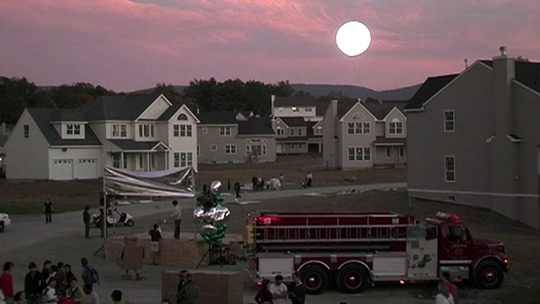Pierre Huyghe. "Streamside Day," film still, 2003. Film and video transfers; 26 minutes, color, sound. Courtesy Marian Goodman Gallery, Paris/New York. © Pierre Huyghe.
In winter 2014-2015, the Lacma sponsored a retrospective of artist, Pierre Huyghe (b. 1962, Paris). I walked into the exhibition and a man in a suit announced my full name into the dark studio. I found a hermit crab in an aquarium wearing a football-sized Sleeping Muse shell. Outside, a bee hive was the head of a lounging, nude sculpture.
Despite these distractions, I spent most of my time in an alcove watching Streamside Day: a video of a celebration Pierre Huyghe invented for Streamside, a recently-birthed planned town in rural New York.
Onscreen, a parade of teenagers in rabbit and bear and horse costumes wander down a dirt street lined with naked wood homes. The smooth, bare earth is carved in the middle of a forest. The fresh-cut barrenness reminds me of a copper mine.
In a dirt quad, families sit on lawn chairs, look at their new neighbors, eat a curated pile of rainbow donuts. The mayor of the town gives a speech into a cheap microphone from a plywood platform.
The scene evokes the feeling of the first day of ninth grade. I look at the faces of the moms and dads who just spent a chunk of change on a down payment for this very new and out-of-the-way place. I get a sneaking suspicion that Huyghe is poking fun of the families. Parading their children around in pagan animal heads. Dotting the scene with silver Mylar balloons, bare plywood, rainbow-colored food. Failing to provide chairs so families bring their own mis-matching fold-ables.
Despite this, in an interview with Art 21, Huyghe said the town, “was under construction when [he] found it, and … created—or invented—a tradition for it … a celebration, once a year.” He continues: “This is a town that has no organicity. It's an image—an instant, pure image. Months ago, there was no town. Now, it's a brand new town with roads.” A new town, which, to Huyghe, warranted a celebration.
Watching the Streamside Day video, I was reminded of the time I once drove 4+ hours from Orange County through the Mojave Desert to the hot scrawled ruins of California City. Brainchild of Nat Mendelsohn, California City is and was an 80,000 acre planned community that was birthed during the New Town Movement of the 1950s. Mendelsohn imagined California City might one day rival Los Angeles.
Though California City did end up becoming home to a few hundred residents – most of whom work for the nearby Airforce base – it is mostly a grid of ghost cul de sacs and crumbling asphalt. Street signs stare over the hard desert ground. California City is the state of California’s third largest city, by geographical area. It can be seen from space. I visited it because I have a thing about New Towns: towns with “no organicity.”
Born and raised in Orange County, CA, most of which is a New Town-type stucco suburban sprawl on the coast of Southern California, I know some of what it feels like to grow up in a New Town. Irvine, CA, is a particularly good example: a grid of glass office buildings and apartment towns built on what feels like an arbitrary spot in a grassy expanse.
I now work in another New Town: Broomfield, CO, which sits halfway between Denver and Boulder. Youtube hosts a video from the 50’s detailing its inception and birth.
The narrator begins by detailing the achievement of a man named Morris Greeley, who paved the path for Broomfield by birthing nearby New Town Greeley, Colorado. “Morris Greeley was a man of vision,” says the narrator. “In the wide horizons of his mind, he saw the stirring future of the American West. After viewing the rich, rolling land that sweeps majestically up to the great wall of the Rocky Mountains, he advised, “go west, young man, and grow up with the country.”
The narrator’s booming voice resonates with the enthusiasm of post-war America -- an America full of middle classers seeking to flee from the dirty urban sprawl toward the healthful environs of the grassy suburbs. The narrator asks: “Why not meet the challenge of a growing area by building a whole new city from scratch … a modern dream city for 30K people where everything is carefully planned from the beginning … ?”
Why not?
“Soon, the detailed planning for Broomfield heights was underway in earnest,” says the narrator. “A firm of experienced city planners was obtained to make a dream city as perfect as man can conceive. Streets were laid out in arcs and curves to conform to the natural landscape … street arteries were planned to carry traffic easily and quickly to and from a smart, modern shopping center.”
I know lots of people who live in Broomfield (no Heights). It’s affordable, is home to dozens of tech conglomerate high-rise office buildings, and, indeed, has some nice views of the mountains. I’m guessing the smart, modern shopping center is the strip mall with the Starbucks and Buffalo Wild Wings.
It’s easy to criticize New Towns such as Broomfield, CO, or Irvine, CA. They’re populated by mostly white, middle class folks. Chain businesses dominate. Homes and apartments matchy-match like they came from a box set. Driving culture dominates. They’re usually dozens of miles from what could be considered a true city, a natural people center.
In fact, the out-of-the-way nature of New Towns is part of their DNA. Distance from the messiness of the people center is what makes New Towns feel safe. I’m not sure if Streamside is or will become a typical New Town, but it has most of the earmarks of one. And, my instinct is to criticize it, to start humming lines from the Father John Misty song:
"they gave me a useless education
... a subprime loan
on a craftsman home"
But, maybe that isn't the right response. At least it didn't seem to be Huyghe's. “When I first saw this town, I just went to see all the people,” said Huyghe. “And then I said, ‘I'm going to invent a celebration because it's a brand new place … I organized the whole celebration—from the parade to the concert, to the food, to the mayor giving a speech, to the kids playing—everything.'”
I hum: "Oh ... just a little ... bored in the USA..." The narrator continues: “on an historic day, the 21st of August, 1955, a town was born … 100 new families had pioneered and found the realization for their dreams.”

